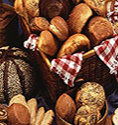Gout is associated with high uric acid levels in the blood. Uric acid accumulates in the body as a result of purine metabolism. Purines could be of diet origin or the body itself. Generally, one-third of the uric acid level in the body is because of purines of dietary source, while the rest comes from the purines in the body.
Uric acid is antioxidant, responsible for 60% of all the antioxidant activity in the body. Blood uric acid levels of 2 - 7 mg/dL for men and 2 - 6.5 mg/dL for women are considered normal. Lower than 2mg/dL is referred to as hypouricemia, where as higher than 6.5 or 7 mg/dL is hyperuricemia. Hyperuricemia is a gout risk factor.
The body maintains this normal range by regulating the uric acid synthesis and excretion. On average, in a day, uric acid level in the body may go up and down by 59 - 119 μmol/L, because of diet and exercise.
The ways to control blood uric acid level and consequently the risk of gout are to limit its synthesis and to help the body get rid of it.
Diet being responsible for one-third of the purine supply to the body, evidently, avoiding or restricting high purine diet or eating low purine diet helps. We have covered foods that can be used to restrict purine intake in these articles: purine in foods, purine in fish, purine in milk, egg, vegetables, purine in meats.
Foods that Lower Blood Uric Acid
Diet could also help reduce risk of gout by improving the rate of removal of uric acid from the body. Some foods contain compounds (polyphenols) that break down uric acid into another molecule called allatonin that can easily be removed in urine, feces, and through skin.
In this article, we will focus on foods that help reduce uric acid level.
- Cherry: Cherry and its products, such as juice, reduce the production of uric acid and increase its rate of removal in urine. In a study of women, consumption of 280 g cherries 5 hrs later resulted in uric acid level reduction from 214 to 118 188 μmol/L.
- Dairy products: Dairy products such as milk, cheese, yoghurt are associated increased rates of uric acid excretion. Dairy products have high qaulity protein, and minerals (calcium, magnesium, potassium), which enhance the reduction. Also, they contain no or very low purine. Studies report that dairy product consumers have less uric acid level than vegans.
- Vitamin C: Vitamin C enhances uric acid removel. Several studies found vitamin C intake be negatively associated with uric acid level. In one study where subjects took 500 mg vitamin C/day, their uric acid level went lower by 0.5 mg/dL.
- Coffee: Both caffeinated and decaffeinated (decaf) coffee are associated with reduced uric acid level. Caffeined coffee being more effective. Two studies that compared people who took no coffee and those who took 1 - 3 cups of coffee per day, reported a 22% reduction in gout risk.
- Fruits, vegetables, seeds (legumes, nuts and whole grain cereals): plant based foods are rich in compounds and minerals are associated lower risk of hyperuricemia (high uric acid level). Plant based foods are major components of diet regimes such as traditional mediterranean diet, Okinawan diet and DASH diet. These diet regimes are known to have low gout risk factors.
Source:
Christopher E. Ekpenyong, Nyebuk Daniel. Roles of diets and dietary factors in the pathogenesis, management and prevention of abnormal serum uric acid levels. PharmaNutrition Volume 3, Issue 2, April 2015, Pages 29-45.
Beate Nickolai, Caroline Kiss. Nutritional therapy of gout. Ther Umsch. 2016;73(3):153-8.
H.K. Choi, G. Curhan. Coffee, tea, and caffeine consumption and serum uric acid level: the third national health and nutrition examination survey. Arthritis Rheum, 57 (5) (2007), pp. 816-821.
Qiangwei Wang, Xu Wen & Jinming Kong (2019) Recent Progress on Uric Acid Detection: A Review, Critical Reviews in Analytical Chemistry, DOI: 10.1080/10408347.2019.1637711



